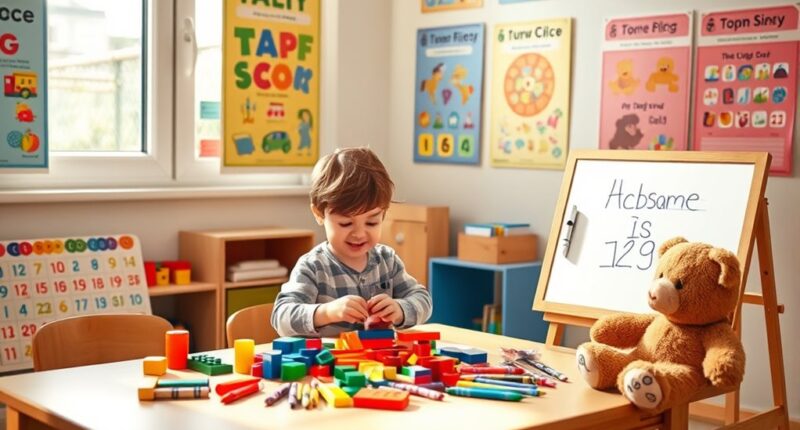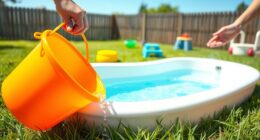To get your child ready for kindergarten, focus on key skills like name recognition and familiarity with the alphabet. Encourage counting and basic math concepts, and help them identify colors and shapes. Develop pre-writing skills through fine motor activities. Social skills are important too, so foster communication and cooperation. Support their emotional readiness and independence with simple routines and chores. Discover more about how to prepare them for success in school.
Key Takeaways
- Children should recognize their name and some or all alphabet letters to support early literacy skills.
- Basic counting, understanding “more than” and “less than,” and simple addition are essential for math readiness.
- Recognizing common colors and basic shapes enhances cognitive skills and prepares children for early geometry.
- Developing fine motor skills through pre-writing activities and effective communication fosters readiness for literacy and social interactions.
- Personal hygiene, independence in daily tasks, and the ability to follow routines are crucial for emotional readiness and self-reliance.
Recognition of Name and Alphabet Familiarity
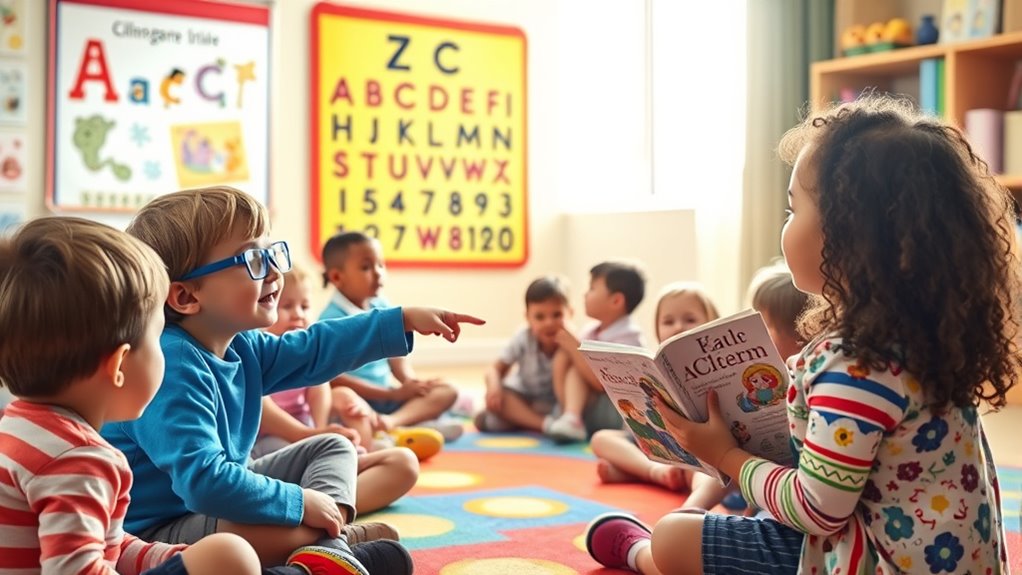
Name recognition and alphabet familiarity are essential skills for children entering kindergarten. Recognizing their name helps kids connect letters to sounds, laying the groundwork for literacy. It also enables them to identify personal items in the classroom, fostering a sense of belonging.
You can enhance name recognition through fun activities like using index cards or sentence strips. These hands-on experiences promote learning with letters and sounds, making it engaging. By the time kindergarten starts, children should recognize some or all alphabet letters, often beginning with their name.
Activities like alphabet scavenger hunts and letter sorting can build this familiarity, setting the stage for future reading success. Emphasizing these skills prepares your child for a smooth progression into the classroom.
Counting and Basic Math Skills
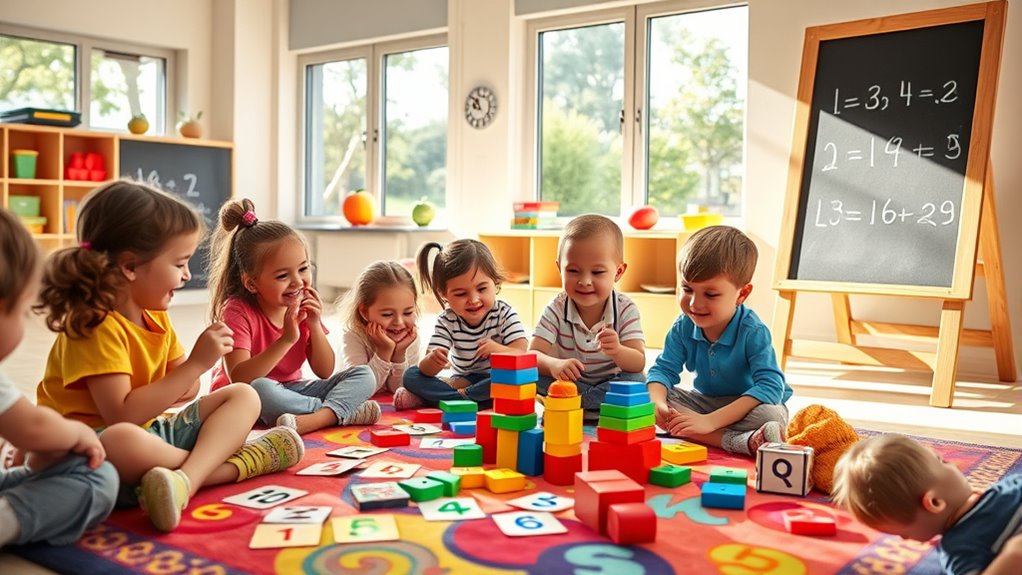
As children prepare for kindergarten, counting and basic math skills become key components of their learning journey. By age four, many kids can count to at least ten, which lays a solid foundation for number recognition.
Encourage them to count everyday objects, reinforcing one-to-one correspondence. Simple activities like sorting toys or playing counting games make learning fun and interactive.
Understanding concepts like “more than” and “less than” is essential, along with basic addition and subtraction. Engaging in pattern recognition activities helps develop their quantitative skills.
Understanding Colors and Shapes

Colors and shapes are essential building blocks for your child’s early learning. Recognizing colors lays the groundwork for visual classification and descriptive vocabulary, which is critical for kindergarten readiness. By the start of kindergarten, your child should confidently name common colors and identify basic shapes.
Engaging in activities like sorting objects by color or shape enhances their cognitive skills and problem-solving abilities. These concepts also support early math skills and spatial reasoning, as understanding shapes is fundamental for geometry.
Play-based learning with colorful books, puzzles, and blocks provides hands-on experiences to reinforce these skills. Overall, mastering colors and shapes not only aids in academic readiness but also fosters logical thinking necessary for future learning.
Development of Pre-Writing Skills
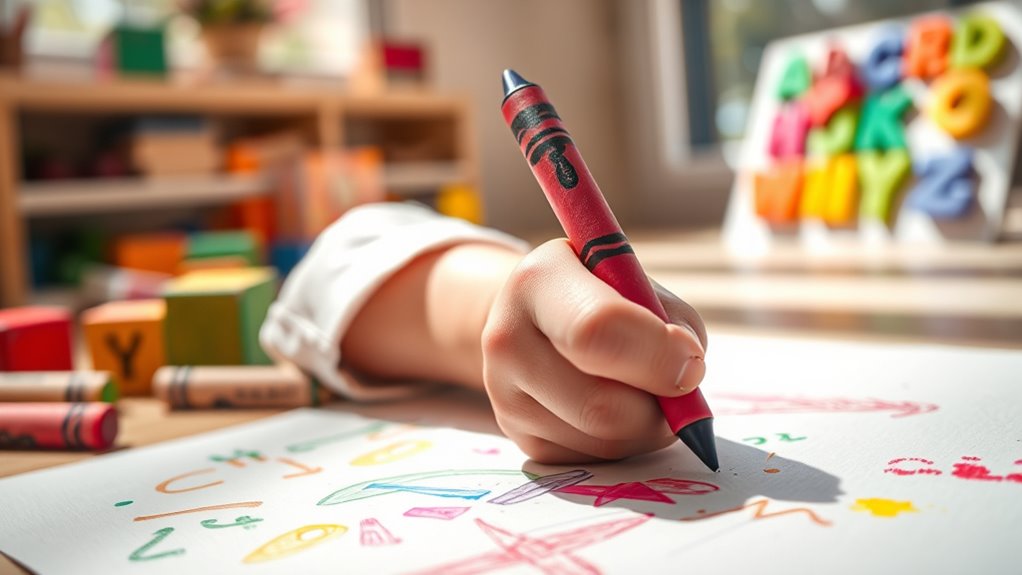
Mastering pre-writing skills is essential for your child’s success in kindergarten. These skills require strong fine motor development, enabling your child to grasp and manipulate writing tools effectively.
Start by encouraging them to draw lines and shapes, like circles and triangles, which lay the foundation for letter formation. Use crayons, markers, or pencils to help develop their hand control while keeping the experience fun through play-based learning.
Activities like tracing lines, drawing shapes, or creating patterns with dot markers can enhance their fine motor strength and cognitive skills. Engaging in these activities together fosters your child’s readiness for literacy and supports their adjustment to the structured environment of kindergarten.
Social Skills: Communication and Cooperation
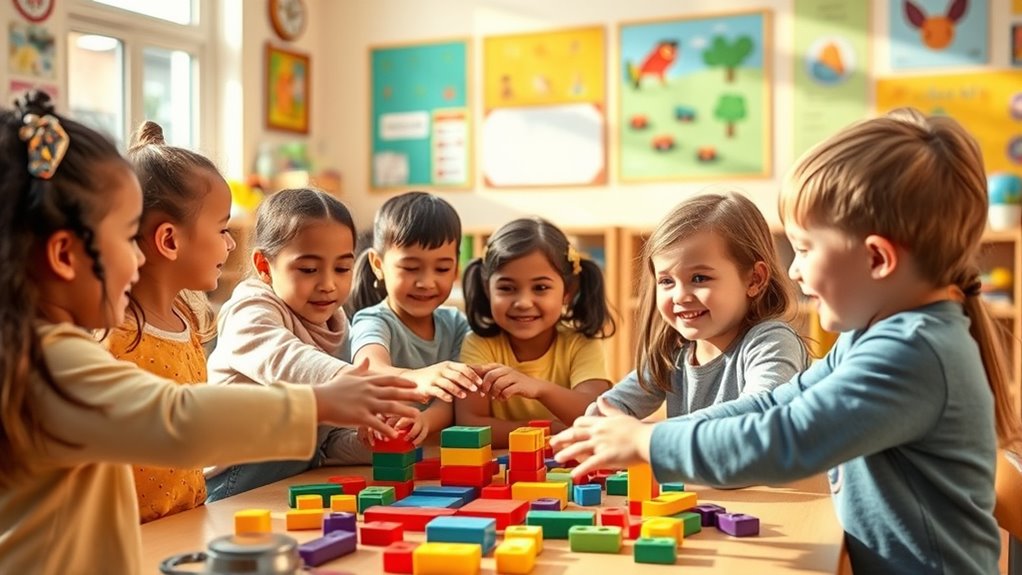
How can children thrive in a kindergarten environment if they lack essential social skills? Effective communication and cooperation are crucial for forming relationships and maneuvering group settings.
Encourage your child to express their thoughts and needs clearly, using storytelling and discussions to build their communication skills. Open-ended questions can help them understand social situations and express emotions. Emphasizing active listening can also support their ability to engage with peers and comprehend social cues.
Cooperative activities, like role-playing and problem-solving, foster teamwork and collaboration. Teach basic cooperation skills, such as sharing and taking turns, to enhance their patience and social interactions. Additionally, promoting emotional readiness and communication will help them navigate interactions with peers more effectively.
Emotional Development and Self-Control
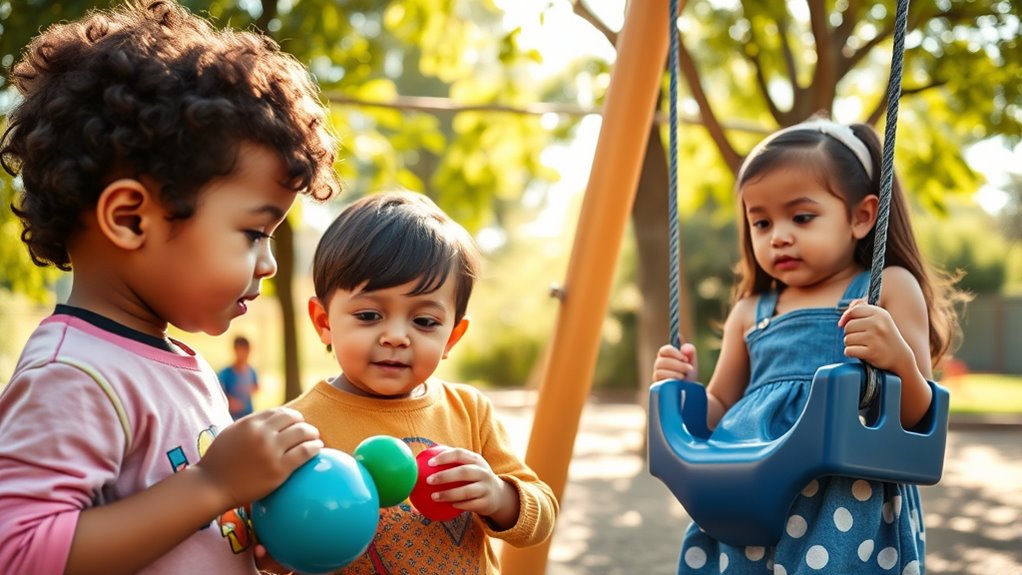
Building on the importance of social skills, emotional development and self-control play an essential role in preparing your child for kindergarten.
To thrive in a classroom, your child needs emotional awareness, which helps them recognize and express feelings effectively. Teaching emotional regulation allows them to manage their emotions and adapt to new environments.
Encourage empathy by discussing others’ feelings and practicing perspective-taking, fostering social harmony. Introduce self-regulation techniques, like deep breathing, to help them control their behavior.
Establish consistent routines for security, and engage in regular emotional discussions to enhance their awareness.
Mastering Gross and Fine Motor Skills
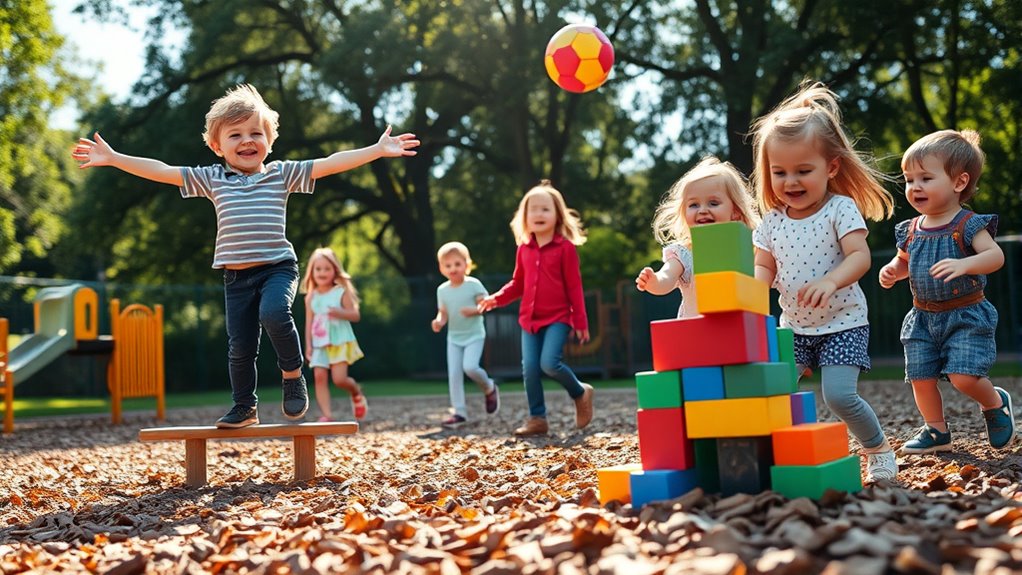
Developing gross and fine motor skills is essential for your child’s readiness for kindergarten.
Fine motor skills, involving small muscle movements in the hands and fingers, are vital for tasks like writing and using scissors. You’ll want to encourage your child to practice holding a pencil correctly, cutting with scissors, and playing with manipulative toys like blocks and puzzles. These activities enhance hand-eye coordination and precision.
On the other hand, gross motor skills, such as running, jumping, and climbing, support physical development. Engaging in outdoor play and playground activities helps improve coordination and balance.
Language Development and Literacy Skills
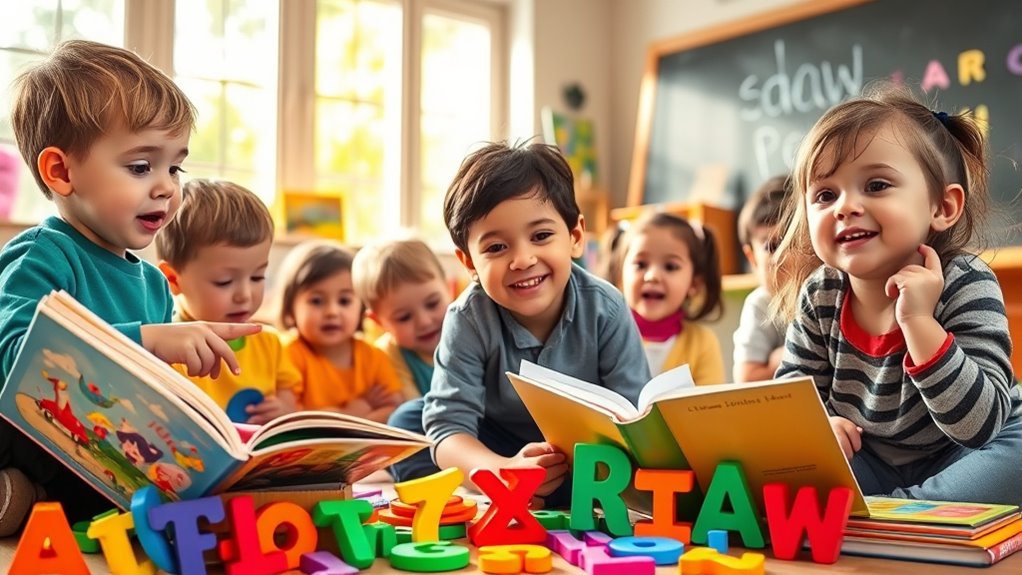
As children grow more adept in their gross and fine motor skills, their readiness for kindergarten expands to include language development and literacy skills. They should be able to speak in complete sentences, follow two-step directions, and express their needs using a vocabulary of 200-300 words.
Engaging in conversations about stories fosters deeper comprehension. Familiarity with books, recognizing their name, and identifying letters are essential for reading readiness. Activities like singing nursery rhymes enhance phonological awareness.
Listening comprehension is significant; children should be able to recall key events and distinguish relevant information. Encouraging social-emotional skills, such as expressing feelings and sharing, further enriches their communication abilities, laying a strong foundation for success in school.
Problem Solving and Reasoning Skills
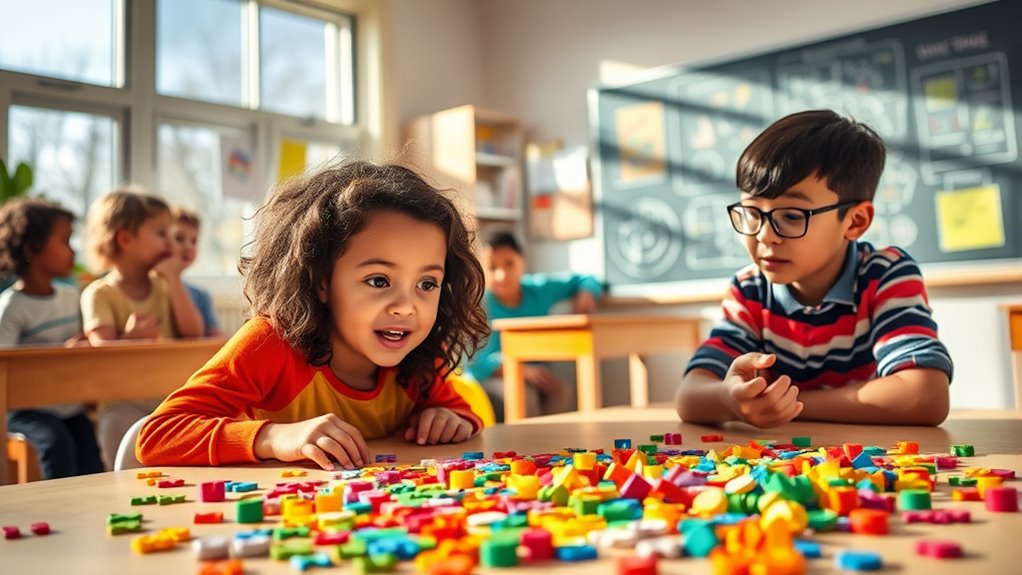
While children explore their world, they naturally encounter problems that require creative solutions, making problem solving and reasoning skills essential for their growth. Developing grit and creativity in facing challenges not only boosts academic success but also builds confidence.
Early exposure to problem-solving involves identifying issues, brainstorming ideas, testing them, and analyzing results. Engaging in activities that promote logical thinking helps kids sequence events and manage setbacks effectively. As they learn to compare objects and understand cause and effect, their reasoning abilities strengthen.
Utilizing structured scenarios and collaborative play enhances critical thinking and decision-making skills. By fostering a supportive environment, you can encourage your child to take risks and develop essential problem-solving skills that will serve them well throughout life.
Self-Care and Independence Skills

Problem-solving and reasoning skills lay a foundation for another important area of growth: self-care and independence skills. Your child should be able to manage basic self-care tasks, like using the restroom without reminders, washing hands properly, and blowing their nose independently.
They’ll also need to dress themselves and handle their shoes. Encouraging independence means allowing them to open containers and manage their personal belongings.
Establishing consistent routines helps them adapt to schedules and understand time management. Assigning simple chores, like making their bed or putting away groceries, fosters responsibility.
Additionally, supporting emotional readiness through self-expression and decision-making builds their confidence. These skills are essential for a smooth progression to kindergarten and daily life.
Frequently Asked Questions
How Can I Assess My Child’s Readiness for Social Interactions?
To assess your child’s readiness for social interactions, observe their behavior during playdates.
Notice if they share toys, take turns, and engage in conversations. Look for signs like eye contact, smiling, and responding to play invitations.
You can also use checklists or rating scales designed for younger children to evaluate their social skills.
Encourage guided playtime and independence, which helps you identify areas where they may need support in social situations.
What Role Does Play Have in School Readiness?
You might think play’s just fun, but it’s vital for school readiness. Through play, your child develops problem-solving skills, creativity, and essential literacy and math concepts.
They learn to interact socially, manage emotions, and communicate effectively. Play enhances cognitive skills like memory and decision-making while also promoting physical development.
How Can Parents Support Emotional Regulation at Home?
To support emotional regulation at home, you can start by creating a consistent daily routine. This helps your child feel secure and reduces anxiety.
Engage in activities that teach coping strategies, like deep breathing or mindfulness. Read books that explore feelings and role-play scenarios to practice responses.
Encourage your child to express emotions through art or journaling, fostering awareness and understanding. Celebrating kindness also reinforces positive behaviors and builds empathy.
What Activities Promote Physical Development Before Kindergarten?
Did you know that children need at least 60 minutes of physical activity each day to promote healthy growth? Engaging your child in activities like kickball, obstacle courses, or trampoline jumping can greatly enhance their gross motor skills.
Incorporating fine motor tasks like playdough manipulation or bead stringing also builds essential dexterity. Additionally, balance activities such as yoga or animal walks improve coordination, setting a strong foundation for their physical development.
How Can I Encourage My Child’s Interest in Reading?
To encourage your child’s interest in reading, create a daily reading routine that fosters excitement.
Choose books that capture their interests and make reading interactive with expressive voices and questions.
Set up a cozy reading nook filled with diverse books, and label everyday items around the house to enhance print awareness.
Engage in conversations that build vocabulary, and incorporate fun activities like storytelling or drawing scenes from the books you read together.
Conclusion
To sum up, ensuring your child is ready for kindergarten sets the stage for their future success. Did you know that children who enter kindergarten with strong social skills are 50% more likely to succeed academically by third grade? By focusing on skills like name recognition, counting, and social interaction, you’re giving your child a solid foundation for learning and growth. So, engage with them in fun activities that build these essential skills, and watch them thrive!
